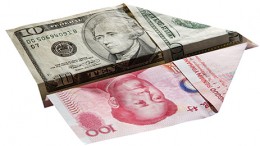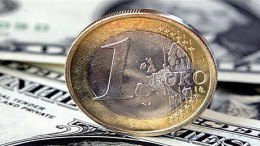euro
The IMF crisis and how to solve it
Euro falls against dollar after Ukraine, Draghi and EZ poor data
MADRID | The Corner | The positive evolution of the American economy and the uncertainty about Europe’s economic recovery, after disappointing data published this week, have led the USD to Euro exchange rate to advance to its highest best level in nine months.
RMB as reserve: Rebalancing the global financial system
By Peter Wong via Caixin | It is unlikely that the RMB or yuan, China’s “people’s currency,” will replace the dollar outright as the world’s only investment and reserve currency any time in the foreseeable future. But there is every indication that the dollar will have to make room for a second global reserve currency within the next 15 years. A revolution allowing investors to diversify risk – and creating a system with more choice and better ability to resist shocks – should be welcomed.
Catalonia exit: a financially doomed move
MADRID | By J. P. Marín Arrese | Water and power supply would be secured should Catalonia become an independent nation. That’s the only reassuring conclusion the economic think tank set up by the regional government has recently reached. On handling monetary and financial issues, it points to severe problems ahead.
Why hasn’t the Euro fallen more?
MADRID | The Corner | The EUR/USD dropped nearly 4 cents from its maximum area in 2014 (very close to 1.40) with a movement that began on 8 may, when Mario Draghi announced that a package of monetary stimulus / liquidity would be used at the June 5 meeting (refi rates drop in 10bp, negative deposit type, completion sterilization SMP and quarterly TLTRO). Why hasn’t the Euro fallen more?
Why All Currencies Are National
By Jean Pisani-Ferry via Caixin | Actions by America’s Justice Department launching a probe against BNP Paribas are a reminder that the major international currency – the U.S. dollar – brings with it legal, judicial and political dimensions.
German Ifo business climate falls to 6-month low
MADRID | The Corner | The much-awaited German Ifo Business Climate Index for industry and trade fell to a seasonally adjusted 109.7 points this month, below forecasts for 110.2 and down from 110.4 in May. Although the country’s firms still make positive assessments of the current business situation, the Munich-based institution explained in a press release on Tuesday, they feel less optimistic about the future. And fear the potential impact of the crises in the Ukraine and Iraq.
The euro goes negative
NEW YORK | By Dickson Buchanan Jr. via Truman Factor | The European Central Bank’s (ECB) decision to charge a negative interest on overnight deposits is not going to lead to a higher targeted inflation rate, despite ECB President Mario Draghi’s insistence that it will. Like all cases of central planning, this decision will have unintended and costly consequences – some of which are already starting to play out.
Easy money, stronger currency?
LONDON | By Chris Walker and Marvin Barth at Barclays | Despite the ECB delivering more easing than expected, the EUR remains close to the levels heading into Thursday’s meeting. Did the ECB then fail? In a word, no. The ECB’s objective is to raise inflation from unacceptably low levels well below its mandate of “less than but close to 2%” and a crucial element of doing so is to keep inflation expectations anchored near the Bank’s target.







